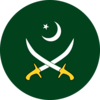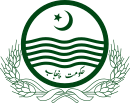Sawar Khan
Sawar Khan | |
|---|---|
| سوار خان | |
| 1st Vice Chief of Army Staff | |
| In office 1 May 1980 – 23 March 1984 | |
| President | Muhammad Zia-ul-Haq |
| Succeeded by | General Khalid Mahmud Arif |
| Personal details | |
| Born | Sawar Khan 1 December 1924 Rawalpindi District, Punjab Province, British India |
| Died | November 2023 (aged 98) Rawalpindi, Pakistan |
| Resting place | Rawalpindi, Pakistan |
| Nationality | Pakistani |
| Spouse | Khadijah Bano |
| Residence(s) | Westridge 1 Rawalpindi, Pakistan |
| Alma mater | Officers' Training School (Bangalore, India) |
| Military service | |
| Allegiance | |
| Branch/service | |
| Years of service | 1946–1984 |
| Rank | |
| Unit | Artillery |
| Commands | |
| Battles/wars | |
| Awards | |
| Post-Retirement Work | Community Service President Northern University, Nowshera Khyber Pakhtunkhuwa |
General Sawar Khan NI(M) HI(M) SBt (Urdu: سوار خان; 1 December 1924 – November 2023) was a four-star general of the Pakistan Army who was the Governor of the largest province, Punjab and the Vice Chief of Army Staff during the era of General Muhammad Zia-ul-Haq, when Zia was simultaneously the Chief of Army Staff (Pakistan) and the President of Pakistan.
Khan died in November 2023, at the age of 99.[1]
Early life and military career[edit]
Sawar Khan was born in Rawalpindi District, British Raj on 1 December 1924.[1] He was commissioned before the independence of Pakistan in 1947 into the Indian Army's Corps of Artillery. He later opted for Pakistan Army in 1947. As a captain, Sawar became the Instructor Gunnery (IG) at the Artillery School.[2]
General officer[edit]
Khan was promoted to Lt. General on 24 March 1976 by General Zia-ul-Haq after he became the Chief of Army Staff superseding five other generals. Sawar Khan who at the time was serving as Adjutant General (AG) at the GHQ was sent as the Commander XI Corps, Peshawar, where he replaced the recently superseded Lt. Gen. Majeed Malik.[3] He continued to serve in Peshawar until January 1978 when he was replaced by Lt. Gen. Fazle Haq.[4] In 1978, Lt. Gen. Sawar Khan moved to Lahore to take over IV Corps as its Corps Commander. He took over from Lt. Gen. Iqbal Khan who proceeded as the Vice Chief of the Army Staff (VOAS), a newly created post.
Martial law administrator of Punjab[edit]
When Zia imposed martial law, the then Lt. Gen. Sawar Khan was sent as the governor of Punjab province in 1978, in addition to his responsibilities as Commander IV Corps, Lahore. He was part of small coterie of generals under General Zia ul-Haq, who determined the national security policies in the martial regime. The other generals were Lt. Gen. Faiz Ali Chishti (Commander X Corps, Rawalpindi), Lt. Gen. Jehanzeb Arbab (Governor of Sindh and Commander V Corps, Karachi), Lt. Gen. Iqbal Khan (CJCSC), and the other military governors of Khyber-Pakhtunkhwa and Balochistan Fazle Haq and Rahimuddin Khan.[5]
After a two-year stint, he was replaced by Lt. Gen. Ghulam Jilani Khan and promoted to four-star general.
| Nishan-e-Imtiaz | |
|---|---|
Nishan-e-Imtiaz(Civilian) Nishan-e-Imtiaz (Military) | |
| Awarded by the Sovereign, on the advice of the Government | |
| Type | Award |
| Eligibility | Pakistani or Foreign citizen |
| Awarded for | The highest degree of service to the state, and for services to international diplomacy. |
| Status | Currently constituted |
| Sovereign | President of Pakistan |
| Sovereign | Prime minister of Pakistan |
| Grades |
|
| Statistics | |
| First induction | 19 March 1957 |
| Precedence | |
| Next (higher) | None |
| Next (lower) | Hilal-e-Imtiaz |
Hilal-e-Imtiaz (Civilian) Hilal-e-Imtiaz (Military) | |
Vice Chief of Army Staff[edit]
In March 1980, when the post of the deputy chief of army staff (created by Zia-ul-Haq) was redefined and re-designated as the Vice Chief of Army Staff, General Sawar replaced Lt. Gen. Iqbal Khan. General Sawar was replaced by the Zia's deputy General Khalid Mahmud Arif in March 1984 after completing the four-year term. Sawar was a professional soldier and hailed from the Potohar plateau of north Punjab, which had been a traditional recruitment area for the British and the Pakistani armies.[7]
Awards and decorations[edit]
| Nishan-e-Imtiaz
(Order of Excellence) |
Hilal-e-Imtiaz
(Crescent of Excellence) | ||
| Sitara-e-Basalat
(Star of Good Conduct) |
Sitara-e-Harb 1971 War
(War Star 1971) |
Tamgha-e-Jang 1965 War
(War Medal 1965) |
Tamgha-e-Jang 1971 War
(War Medal 1971) |
| Pakistan Tamgha
1947 |
Tamgha-e-Sad Saala Jashan-e-
(100th Birth Anniversary of |
Tamgha-e-Jamhuria
(Republic Commemoration Medal) 1956 |
Hijri Tamgha
(Hijri Medal) 1979 |
| Order of Military Merit
(Jordan) |
War Medal | India Service Medal | Queen Elizabeth II
(1953) |
Foreign Decorations[edit]
| Foreign Awards | ||
|---|---|---|
| The Order of Military Merit (Grand Cordon) | ||
| War Medal 1939-1945 | ||
| India Service Medal 1939–1945 | ||
| Queen Elizabeth II Coronation Medal | ||
References[edit]
- ^ a b "General Sawar Khan dies at 99". 24 Digital. 8 November 2023. Retrieved 8 November 2023.
- ^ EAS Bokhari "Late Lt Gen SM Abbasi" Defence Journal, April 2002
- ^ A.H. Amin "Remembering Our Warriors: Maj Gen (Retd) Tajammal Hussain Malik" Defence Journal, September 2001
- ^ Rahimullah Yusufzai. "Change of Guard at Peshawar's 11th Corps" The News, 10 May 2001
- ^ Rizwan Hussain. "Pakistan and the Emergence of Islamic Militancy in Afghanistan" Ashgate Publishing, 2005, ISBN 0-7546-4434-0
- ^ Note: It is usually given all together. Only Military officers from Pakistan Defence Forces are awarded the ribbon which is attached to their respected uniform
- ^ Pakistan under Zia, 1977-1988 By Shahid Javed Burki Asian Survey, Vol. 28, No. 10 (Oct., 1988), pp. 1082–1100
See also[edit]
- 1924 births
- 2023 deaths
- Pakistan Military Academy alumni
- Pakistan Army Artillery officers
- Pakistani generals
- Pakistani military personnel of the Indo-Pakistani War of 1971
- Military government of Pakistan (1977–1988)
- Governors of Punjab, Pakistan
- Recipients of Nishan-e-Imtiaz
- Pakistani academic administrators


